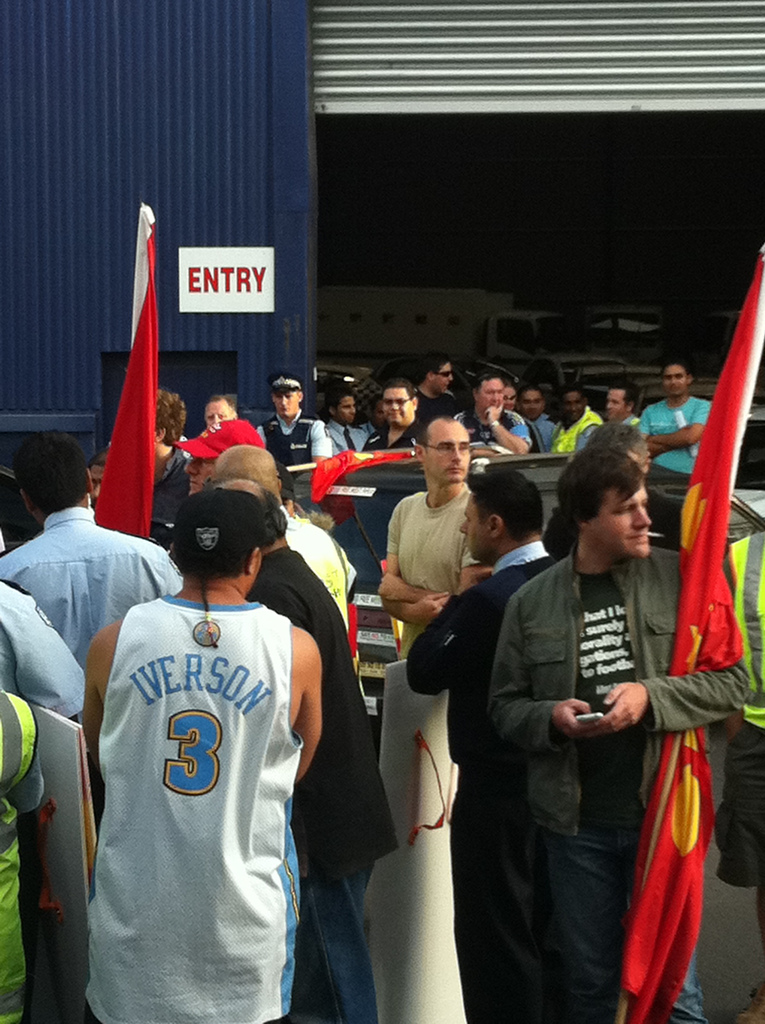The following article by Jared Phillips will shortly be published in the April issue of The Spark.

On April 1 the new anti-worker laws were introduced. The three main changes are increased restriction on the ability of union organisers to access workplaces, the introduction of 90-day probationary employment periods, and the ability for the employer to require a medical certificate for only one day’s sickness.
The fact that service sector employers (casino and security) have been so quick to lock out workers is evidence that the employing class is currently acting with a great deal of confidence.
In this environment of attacks on workers and their unions it is positive to see that some groups of workers have been taking the initiative to fight the employers.
Unite/SFWU and SkyCity casino
In the last issue of The Spark we reported on the New Year’s Eve strike and subsequent strike actions that had been taken by Unite and Service and Food Workers Union members at the Auckland Skycity Casino. Prior to those events the casino bosses had tried to entrap the unions in a ‘take-it-or-leave-it’ offer which included that the new contract would have a three-year term. Long terms of agreement like this can have the effect of demoralising union members by placing such long periods of time between union negotiations. So action had to be taken. The company responded to the strike actions and on March 6 issued a notice stipulating that any worker who took any form of industrial action, such as a short lightening strike, would be locked out for one whole week.
The lockout notice was met with escalated hard resistance by the unions on Monday March 7. At one stage the union physically blocked the main public and taxi driveway into the casino by parking cars on it. There was also an act of violence carried out by a security guard against a Unite official.
The fightback on March 7 persuaded the company to re-enter negotiations and change its ‘take-it-or-leave-it’ stance. In particular they have agreed to a two-year term of agreement which has been the length of term of the previous agreements at the casino.
Unite and First Security
Unite had been in negotiations with First Security for some months for a renewed union contract. On Friday 18 March the Auckland security guards began a strike action. The company responded by issuing a lock-out notice to the striking workers which it intended to be effective until 6pm on the following Monday. The lockout was issued against patrol guards only, static guards weren’t placed under a lockout notice. The Unite members held a meeting at Unite’s head office on the Saturday morning and decided to challenge the lockout head on by placing a hard picket at the company’s main office and dispatch centre. This started at 5pm on Saturday.
It was a militant action with about 30 members being actively involved on the picket line. There were confrontational moments involving police and a tow truck. Even during that morning’s meeting the company had sent people onto Unite’s property to retrieve the company vehicle of a locked-out guard.
This was the second lockout Unite had faced in March and the outcome – due to Unite’s response – was positive. Workers who were members of the union at March 20 will be receiving a three percent increase back-dated to February 1, 2011, and a further one percent increase from June 1, 2011. New members of Unite, and possibly non-union members, will receive the four percent pass-on, but will do so over a much longer period of time, with one percent from date of ratification, two percent from June 1, 2011, and a further one percent at the end of the contract on December 31, 2011. A number of conditions were changed favourably for the employees, including with regard to application of penal rates, refining of travel allowance rules, and long service leave.
NDU/Chemical workers and Nuplex
On February 25, National Distribution Union and Northern Chemical Union members took strike action against Nuplex, a company within the aluminium industry. The Spark understands that one of the main issues was the company’s attempt to implement labour flexibility arrangements that were in favour of the employer. Following on from the strike action, members engaged in go-slow activities which proved to be the successful tactic to win and end the dispute.
The year ahead
Throughout the last quarter of last year some reasonable rallies were held in opposition to the anti-worker laws. This was supposed to continue this year with emphasis on national rallies on April 1st to signal that unions are going to remain focussed against the new legislation. The April 1 rallies have now been cancelled with the CTU saying that the decision to cancel was made as a result of the Canterbury earthquake. There is scepticism throughout much of the union movement as to whether the earthquake is the real reason for the cancellation of the rallies and there is speculation that some public sector unions have withdrawn support for such basic rallies. The EPMU – which we understand has generally remained in favour of the rallies – is preparing to deflect or neutralise the new legislation through its renegotiations of collective agreements. Hopefully an uncompromising attitude towards inclusion of the new legislation will produce some of the battles we need to put militant unionism back on the agenda.
See here for a socialist analysis of the anti-worker laws.

Just another WordPress site
